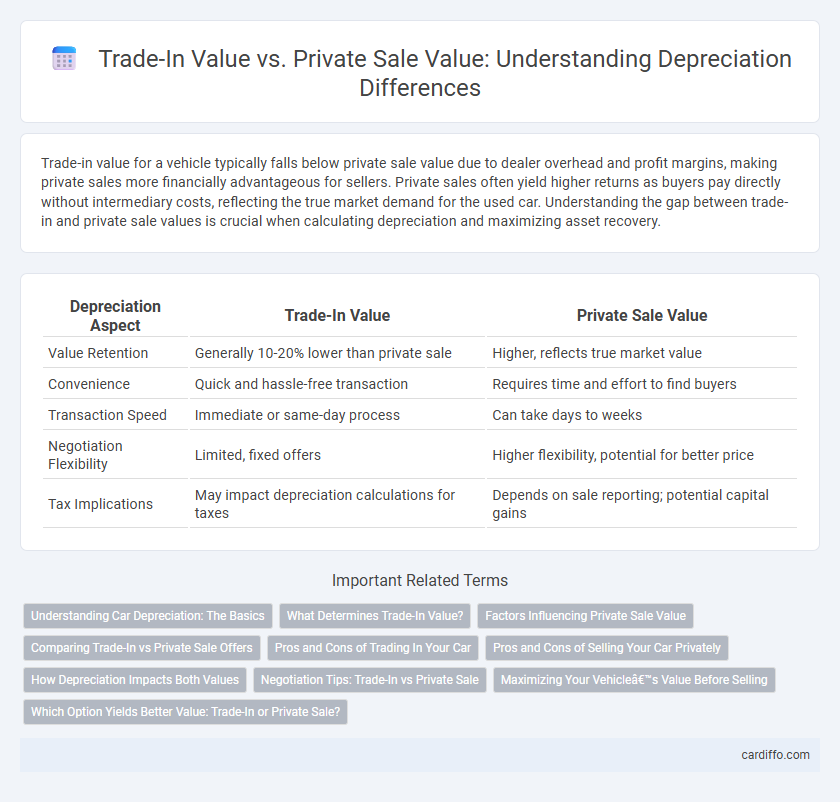Trade-in value for a vehicle typically falls below private sale value due to dealer overhead and profit margins, making private sales more financially advantageous for sellers. Private sales often yield higher returns as buyers pay directly without intermediary costs, reflecting the true market demand for the used car. Understanding the gap between trade-in and private sale values is crucial when calculating depreciation and maximizing asset recovery.
Table of Comparison
| Depreciation Aspect | Trade-In Value | Private Sale Value |
|---|---|---|
| Value Retention | Generally 10-20% lower than private sale | Higher, reflects true market value |
| Convenience | Quick and hassle-free transaction | Requires time and effort to find buyers |
| Transaction Speed | Immediate or same-day process | Can take days to weeks |
| Negotiation Flexibility | Limited, fixed offers | Higher flexibility, potential for better price |
| Tax Implications | May impact depreciation calculations for taxes | Depends on sale reporting; potential capital gains |
Understanding Car Depreciation: The Basics
Trade-in value is typically lower than private sale value due to dealerships factoring in reconditioning costs and profit margins, directly impacting the depreciation calculation of a vehicle's worth. Depreciation reflects the loss in a car's value over time driven by factors such as age, mileage, and market demand, which influence both trade-in and private sale prices differently. Understanding these depreciation dynamics helps car owners make informed decisions when selling or trading their vehicles.
What Determines Trade-In Value?
Trade-in value is primarily determined by the vehicle's current market condition, mileage, age, and demand within the dealership's inventory. Dealerships consider wholesale pricing guides such as the Kelley Blue Book or NADA Guides to estimate trade-in offers accurately. Factors like wear and tear, mechanical condition, and any necessary repairs also significantly influence the final trade-in value offered.
Factors Influencing Private Sale Value
Private sale value is influenced by factors such as vehicle condition, market demand, mileage, and model popularity, often resulting in higher returns compared to trade-in value. Sellers can leverage online listings and personal negotiations to maximize private sale value by highlighting maintenance records and vehicle upgrades. Seasonal trends and geographic location also significantly affect the private sale value, differentiating it from standardized trade-in offers.
Comparing Trade-In vs Private Sale Offers
Comparing trade-in value versus private sale value reveals that private sales often yield higher returns due to direct negotiations with buyers, bypassing dealership markups and fees. Trade-in offers tend to be lower because dealers factor in reconditioning costs and reselling overhead, providing convenience at the cost of reduced payout. Evaluating depreciation impact on each option helps vehicle owners choose the best financial outcome based on their urgency and market demand.
Pros and Cons of Trading In Your Car
Trading in your car offers convenience by streamlining the sales and purchase process, often allowing for immediate application of the trade-in value toward your new vehicle, which can reduce upfront costs. However, trade-in values typically fall below private sale prices due to dealerships factoring in reconditioning, wholesale costs, and a margin for resale profit. Opting to trade in may save time and effort but often results in receiving less money compared to pursuing a private sale, where owners can negotiate directly and potentially secure higher offers.
Pros and Cons of Selling Your Car Privately
Selling your car privately often yields a higher sale price compared to trade-in offers, maximizing your vehicle's value by targeting individual buyers willing to pay more. This method requires significant time investment and effort in advertising, negotiating, and handling transaction logistics, which can be challenging and stressful. Private sales lack the convenience and immediate payment assurance provided by dealerships, potentially prolonging the sale process and increasing the risk of fraud.
How Depreciation Impacts Both Values
Depreciation reduces a vehicle's market value over time, directly influencing both trade-in and private sale values by lowering the amount a seller can expect to receive. Trade-in values are often lower than private sale values because dealerships factor in depreciation alongside reconditioning and resale costs to determine their offer. Private sale values typically reflect a higher price since they capture the vehicle's current market demand and condition more accurately, but both are ultimately constrained by the rate and extent of depreciation.
Negotiation Tips: Trade-In vs Private Sale
Maximizing vehicle depreciation recovery involves understanding the trade-in value typically falls below private sale offers due to dealer wholesale pricing and immediate transaction convenience. Emphasizing detailed vehicle maintenance records and market comparables strengthens negotiation leverage whether dealing with trade-in appraisers or private buyers. Timing the sale during peak demand seasons can significantly boost private sale outcomes, surpassing trade-in depreciation losses.
Maximizing Your Vehicle’s Value Before Selling
Maximizing your vehicle's value before selling hinges on understanding the differences between trade-in value and private sale value, as private sales typically yield 20-30% higher returns compared to dealer trade-ins. Enhancing vehicle condition through thorough cleaning, minor repairs, and maintenance boosts appeal, significantly narrowing the depreciation gap. Accurate market research on similar models' private sale prices enables setting optimal asking prices, ensuring maximized financial returns before final sale transactions.
Which Option Yields Better Value: Trade-In or Private Sale?
Private sale value typically yields better financial returns compared to trade-in value due to direct negotiation and the absence of dealer margins. Trade-in offers convenience and immediate transaction but often at a lower price reflecting dealer reconditioning costs and profit. Depreciation impacts both, yet private sales generally capture more of the vehicle's residual value.
Trade-In Value vs Private Sale Value Infographic

 cardiffo.com
cardiffo.com